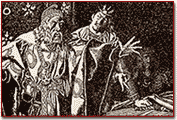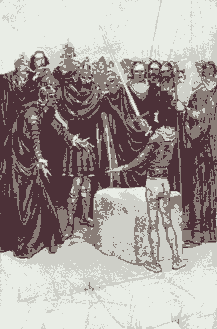The months passed and there came a day when a son
was born to Uther and Igraine, and the little
child was wrapped in cloth of gold and given to
Merlin, who carried him swiftly away from the
castle of the king to the home of a knight
named Sir Ector. Sir Ector's lady took the
babe as her foster-child, and he was christened
Arthur and reared as a brother to her own
son, Kay.
Two years later that which Merlin had foreseen
took place, and King Uther fell sick and lay
dying, with his good Queen Igraine weeping at
his bedside. Then Merlin came to see the
king at the head of all the nobles and asked,
"Is it your wish that Arthur, your son, should
be king when you are gone?" And before all the
great lords gathered there, King Uther said,
"That is my wish and my command." After that
he spoke no more, but died. And soon
Queen Igraine was also dead, for she did not long survive her lord. And again as Merlin had
foreseen, once the land was without a strong
man to rule it, the nobles fell to quarrelling
amongst themselves and gathering each of them
his own army and marching against his
neighbor; and in the heart of each one was
the thought, "Wherever he is, what is this child
Arthur to me? Surely I myself am more fitted
to be king than any other in the land? And
so it went on for many years with all Britain
in great turmoil and distress.
 But in the house of Sir Ector,
young Arthur grew into a handsome lad, courteous and brave; skilled in horsemanship and all knightly feats, obeying and honouring those whom
he thought his parents, and ever loving his
supposed brother, Kay. Often Merlin would
come to Ector's house and talk with Arthur,
telling him strange and marvelous things and
teaching him much that a king should know;
though Arthur guessed not why he was thus
favored by one whose wisdom had been respected
by a monarch.
But in the house of Sir Ector,
young Arthur grew into a handsome lad, courteous and brave; skilled in horsemanship and all knightly feats, obeying and honouring those whom
he thought his parents, and ever loving his
supposed brother, Kay. Often Merlin would
come to Ector's house and talk with Arthur,
telling him strange and marvelous things and
teaching him much that a king should know;
though Arthur guessed not why he was thus
favored by one whose wisdom had been respected
by a monarch.
 When
Arthur was some fourteen years old, Merlin
caused, by his enchantments, a large stone to
appear before the great church in London.
Upon this stone was an anvil, and thrust into
the anvil was written in letters of gold,
"He who draws forth this sword is the rightful
king of Britain."
When
Arthur was some fourteen years old, Merlin
caused, by his enchantments, a large stone to
appear before the great church in London.
Upon this stone was an anvil, and thrust into
the anvil was written in letters of gold,
"He who draws forth this sword is the rightful
king of Britain."
When the people saw this, they all marveled and
many tried to draw forth the sword, but they
all failed. Therefore ten knights were chosen
to guard the stone and the anvil day and night,
that they might keep watch for him who was
to be their king.
Soon after, a great tournament and jousting were
proclaimed in London for New Year's day, and
knights came from over the land to try their
skill at arms, many amongst them hoping to
draw the sword from the anvil.
Kay, recently ordained a knight, was eager to
show his skill before strangers and wished
to test his courage in the tourneying, so he
begged his father permission to travel to
London to take part in the great gathering.
To this Sir Ector agreed and set forth together
with Arthur as squire to the newly ordained
knight.
On the day of the jousting, the three of them
rode to the place of the contests; but in his
eagerness, Kay had forgotten his sword and
left it at the inn. Upon arrival, Kay realized
his mistake and commanded Arthur to ride back
to the inn to fetch it for him.
He rode along the streets looking for someone
from whom he might borrow a sword, but he saw no
one at all. Just as Arthur was despairing,
he saw before him the great church, and
there, in front of it, the stone with the anvil
and sword.
Even the ten knights who guarded the stone
were gone to the tourneying, so no one saw
Arthur when he dismounted and walked up to the
stone. He took hold of the hilt of the sword
and gave a mighty pull, but to his surprise,
the sword came out the anvil easily. He mounted
his horse and galloped back to where Kay waited for him at the entrance to the tourney-ground.
"Here is a sword for you brother," he said.
Kay looked at the sword and knew at once that
it was the sword of the anvil, for he had
stared at it the day before, wondering if he
might try to draw it free. He went to Sir Ector and held out the sword. "Here is the sword
from the anvil father. Am I to be king of
all Britain?"
With wonder, Sir Ector asked him, "How did
you come by it?"
Kay stared at the ground and slowly said, "My
brother Arthur gave it to me."
Sir Ector summoned Arthur and questioned him,
and Arthur said, "I drew it out from the anvil
that my brother might not lack a sword. Have
I done wrong?"
The three of them rode back to the church and
Sir Ector and Kay tried to remove the sword after
Arthur had put it back in the anvil. They both
tried with all of their strength but could
not budge it.
"Now Arthur shall try," said Sir Ector. And
when Arthur set his hand to the hilt of the
sword, he drew it forth with no effort.
Marveling, Sir Ector said, "You shall be king
of Britain, Arthur."
"For what reason shall I be king, father?"
Sir Ector pointed to the letters of gold that
were graven on the anvil, "Because it is
decreed," he said. And he knelt before Arthur
and Kay knelt beside him.
"Do not kneel to me, father," pleaded Arthur
with distress.
"I am not your father, lord, said Ector. And
he told Arthur of how Merlin had brought a
little child to him wrapped in a cloth of
gold. "And I thought then, and have thought
ever since, that you came of nobler blood
than I or mine," he said.
But when Arthur knew that he was not Sir Ector's
son, and that Kay was not his brother, he
wept and said, "You and your lady have ever been
kind to me, and I could not have loved you
more had you been my own parents, nor could I
love Kay more were he truly my brother, and now
I must lose you all?"
"You must be king," said Sir Ector gently, "for
it is decreed, and only one who was a coward
and worthless would shirk a duty God has set
upon him."
Yet Arthur still wept. "I shall never forget
all you have done for me. When I am indeed
king, ask what you will of me, and it shall
be yours."
"I am an old man," said Sir Ector, "and for
myself I ask nothing. But there is Kay. If
you would make him seneschal of all your
household, then should I be well content."
"It shall be son," promised Arthur.
Afterwards, Arthur had to replace the sword in
the anvil, and then once again, in full sight
of all the people gathered there, he had to
draw it forth; and with one accord they
called to him as their rightful king and all
the lords who were weary of the quarrelling made
peace and swore to follow Arthur, so that all
the land was his.
His first deed when he was crowned was to
fulfill his promise to Sir Ector, and make Kay
his seneschal, the chief lord of all his
household.
Good Sir Ector and his lady died soon after,
but Sir Kay the Seneschal grew up to have a
bitter tongue which he took no pains to curb.
He was quick to anger, and his ungracious ways
lost him many a friend; but Arthur always loved
him, and for himself, not merely for the
remembrance of the childhood they had passed
together. And for his part, Kay loved Arthur
jealously, serving him with devotion even while
he criticized what he chose to regard as folly:
the king's rashness in danger, his unfailing
generosity, and the trust he showed to all.